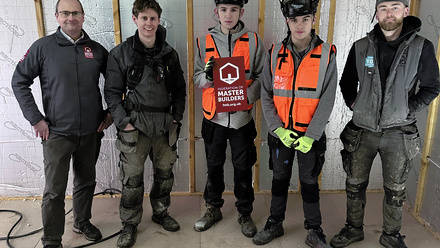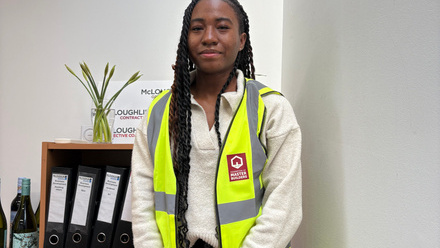Kaidan Radford works for Radford Construction Services and he is a bricklaying apprentice from the Northeast of England. He has previously completed two other NVQ qualifications, one of which won him an award as the apprentice of the year at his local college. Kaidan is an inspiration to other young people as he has Reactive Attachment Disorder (RAD) and Autism Spectrum Disorder (ASD), severe dyslexia and dyspraxia, and despite the challenges that these disabilities have presented, has still managed to be hugely successful in his career.
We asked Kaidan a few questions about his experience working in construction and we also got his views on why other young people should consider joining the industry.

Q1. What made you want to work in the construction industry?
We have a family run construction company, and I spent a lot of my childhood helping my dad make things. I did try working in other jobs, as my family and I thought it best I tried, but I couldn't get into them, and felt hindered by my disabilities. I've always been better at making things and working with my hands and really enjoy it.
Q2. What has been the most difficult part of being an apprentice and how did you overcome those challenges?
I have special needs ASD, RAD and severe dyslexia and dyspraxia which has been a huge challenge throughout my life. At school I had a scribe and special equipment to help, but that's not available on site. It means that I have to adapt ways to work. Thankfully, I completed my maths and English at school, and they are important but not to the extent pushed in college as there are other ways to work things out. There are lots of kids who struggle academically but are brilliant with their hands and are put off joining the trades due to this. I did find the general site banter confusing at first but now join in.
Q3. What would you say to anyone considering getting into the industry?
If they are wanting to do a trade like joinery or bricklaying I would suggest trying to do a multi skill course first. That's what I did. Then you can see what areas you enjoy best and where your skills are.
Also, you get an understanding of and appreciate other tradesmen's work. I am doing brickwork, but if I'm not needed for that I can and will go and help out other trades. If you are able, try to go and go help out for a few weeks' work experience, to understand how sites work. I was lucky to be able to do that.
Q4. What is a common misconception about working in construction?
That it is poorly paid and not a career you can progress in. My dad started as a joiner, then did tutoring, and now runs his own company. Construction is now getting more inclusive and getting away from the stereotype. There are girls taking on apprentices now as well as special needs.
It's not all outside, dirty work. there's a range of jobs outside of the site.
Q5. How has working in construction bettered your life?
I’ve learned a lot from other staff and trades. I feel much more confident in my abilities.
When younger I was told by peers that my disabilities would really hinder me. I would probably never drive and finding a job would be difficult. Going to college initially to do my multi skills gave me confidence and I passed my driving theory and then my driving test first time. Yes, it took longer than most, but I have my own car now.
Then I decided to do my brick working. In short, I now feel useful instead of useless.
Q6. What do you enjoy the most about working in construction?
I like the day-to-day learning and to see finished projects that I have helped on. What we have built as a company. I like the fact there are always new challenges. You learn skills that you can use outside of work in your everyday life. Also, I have made lots of new friendships in college and on site.
Notes to editors
The Federation of Master Builders (FMB) is the largest trade association in the UK construction industry representing thousands of firms in England, Scotland, Wales and Northern Ireland. Established in 1941 to protect the interests of small and medium-sized (SME) construction firms, the FMB is independent and non-profit making, lobbying for members’ interests at both the national and local level.
The FMB is a source of knowledge, professional advice and support for its members, providing a range of modern and relevant business building services to help them succeed. The FMB is committed to raising quality in the construction industry and offers a free Find a Builder service to consumers.






